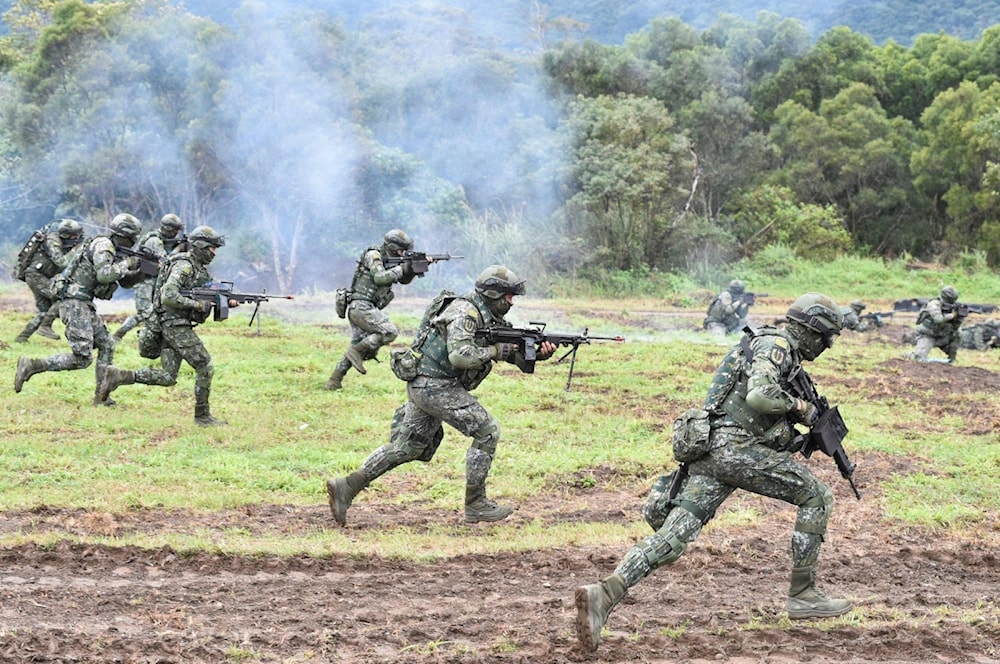Taiwan confirms US forces stationed on front line islands with China
Taiwan's Defense Minister says that this "exchange" aims at learning from US troops' strengths and to close vulnerabilities.
-

Taiwanese soldiers staging an attack during an annual drill at a military base in the eastern city of Hualien, Taiwan, January 30, 2018 (AFP)
Taipei confirmed the presence of US soldiers on its front-line islands with China across the Taiwan Strait, including one just a few kilometers away from China's southeast shores and over 150 km away from Taiwan's main island.
The deployment comes as part of the National Defense Authorization Act (NDAA), signed in 2023 between Washington and Taipei, which permits US forces to be stationed on the island to provide training for Taiwanese forces.
Read more: China-Taiwan reunification, US weapons won't come in-between
"This exchange is for mutual observation, to identify the problems we have, figure out how to improve and to recognize their strengths so we can learn from them," Taiwan's Defense Minister, Chiu Kuo-cheng, said Thursday.
Mass training
One of the Taiwanese islands that US special forces have been sent to is Kinmen, which lies almost 5 km away from the east of the Chinese coastal city of Xiamen, The Wall Street Journal reported.
The outlying islands, including Kinmen, are where most of Taiwan’s frogmen are stationed, a research fellow at the Taiwan-based Institute for National Defense and Security Research said.
US training of Taiwanese forces has focused on strengthening Taiwan’s rear security, in particular the prevention of infiltration attempts, INDSR's specialist Su Tzu-yun said.
Read more: US preparing for potential Taiwan conflict: Reuters
Asked to confirm whether or not American Army Green Special Forces (Green Berets) were in Taiwan on a permanent basis, Chiu told reporters last week, "No matter the situation, there may be blind spots or shortcomings. So we need to communicate with our allies—whether it is a team, a group, or a country."
In the past, Taiwan had to send its special forces officers to the United States for training, but now, American forces are coming to it instead, opening the door to expose a much larger number of Taiwan's soldiers to US combat expertise, acting deputy CEO at INDSR said.
“It makes the training more complete, which I think is very meaningful,” according to Shen Ming-shih.
Experts even suggest that Kinmen is a logical place for training.
“If you’re bringing in a training element, you want to train where the troops are rather than have to take the entire command and move it somewhere else for political expediency,” said Drew Thompson, a senior research fellow at the Lee Kuan Yew School of Public Policy in Singapore and formerly a Pentagon official responsible for China.
Inevitable reunification
Beijing has repeatedly affirmed its position that Taiwan belongs to mainland China, citing historical context, and has constantly affirmed its opposition to Washington's increasingly hostile policies in the South China Sea and its encroaching on its geopolitical sphere, particularly regarding the island.
In his New Year's address last December, Chinese President Xi Jinping adamantly declared the reunification of Taiwan inevitable.
"Compatriots on both sides of the Taiwan Strait should be bound by a common sense of purpose and share in the glory of the rejuvenation of the Chinese nation," he said then.
Read more: US Republican lawmaker to attend Taiwan presidential inauguration
This came shortly after Xi Jinping told US President Joe Biden in a November summit in San Francisco that China will ultimately reunify with Taiwan, albeit on an undetermined timeline.
Meanwhile, the United States has repeatedly claimed it adhered to the One China policy, which is a nonnegotiable prerequisite to any diplomatic relations with Beijing. While Washington has no official diplomatic ties with the island, it has signed a series of military and arms agreements, all explicitly directed against China.
The Taiwan Relations Act, signed in 1979, commits the United States to supply weapons to the island and any services it needs to "defend itself from China." However, Washington remains extremely vague over whether it would directly join Taiwan in any war with China or would assume a less involved role.
Biden has repeatedly said the United States would "defend Taiwan," but US officials have claimed there is no change to the American official policy.
Read more: In possible Taiwan war, US munitions can't sustain a week: Congressman

 4 Min Read
4 Min Read








